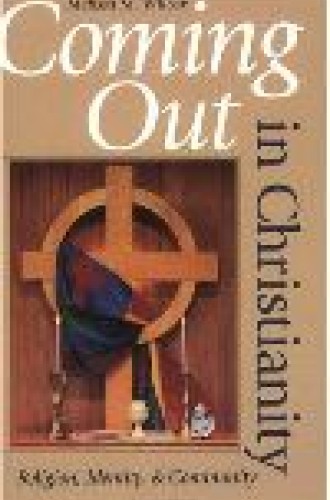Coming Out in Christianity: Religion, Identity and Community
While “gay Christian” is an oxymoron to some conservative Protestants, it is an equally bewildering term to many radicals in the gay liberation movement. To “come out” as a Christian in the gay community can be as trying as it is to come out as a homosexual in the church. Melissa Wilcox addresses this issue from both the secular and the religious side. Not only does she address those who wonder how people who call themselves Christian can persist in being gay or lesbian, but she acknowledges that when she began her study, she “could not fathom why any self-respecting lesbian would want to be involved with a religion so heavily implicated” in antifeminist and antigay activities.
As one who has kept track of developments in the gay community, Wilcox knows that identities have become more complex since the 1970s. In addition to gay men and lesbians, there are bisexuals and “transgender” people who may exist between gender identities or be in the process of transition from one to the other. Rejecting the assumption that “all of these very different people share identical experiences,” Wilcox nonetheless speaks of “the LGBT community” as people who have in common their historical marginalization both by conventional society and, especially, by the church. Still, most of the people she is concerned with are homosexual.
Wilcox’s study focuses on members or sometime attendees of two congregations of the Metropolitan Community Church in California in the late 1990s. Each congregation is made up of a mixture of LGBT (and even heterosexual) people of various socioeconomic, religious and ethnic backgrounds. The congregations differ primarily in theology, one more trinitarian and charismatic the other more unitarian and metaphysical. Wilcox observes that the MCC, founded in 1968 by the defrocked Pentecostal preacher Troy Perry, is now theologically latitudinarian. She thus explicitly parts company with my own argument, put forth in a journal article some ten years ago, that the MCC derived much of its strength from Perry’s theological conservatism.
Yet she does agree with me that the “essentialism” in Perry’s message speaks more convincingly to the experience of gays and lesbians than does the “constructivist” theorizing of feminist and “Queer Theory” radicals. Beginning in the 1960s, it became accepted wisdom among academic gender theorists that “masculinity” and “femininity,” as well as “homosexuality” and “heterosexuality” (that is, both gender identity and sexual orientation), were not “essential” attributes of a person but “social constructions” more or less artificially imposed on an underlying protean continuum of human possibility. But Perry, a high school dropout who was raised in the Pentecostal subculture of northern Florida before immersing himself in Los Angeles’s gay underground in the mid-1960s, spoke from his heart when he affirmed to his first followers in the MCC that he was “born gay” with the full knowledge and blessing of God. “Yes,” he wrote in 1972, “God created homosexuals and homosexuality.”
In the past decade, a serious if controversial literature on a hypothesized “gay gene” has appeared. Perry, however, didn’t need a full etiological theory to find a ready audience among the vast majority of gay men and the high percentage of lesbians who experience their sexual orientation as a given, not a choice. When Wilcox, an academically trained sociologist writing “as a non-Christian but also as a member of the LGBT community,” broached this topic to her 72 interviewees, most affirmed they had “been born LGBT.” “For the vast majority,” she concludes, “essentialism reigned supreme.”
Wilcox uses her interviews to understand the processes by which these people found their way to the MCC. Despite California’s legendarily unchurched population, few were converts to Christianity. The great majority had grown up as Catholics or Protestant, and most had experienced difficulty in reconciling their religious and sexual identities, coming to the MCC only after that reconciliation was well under way.
Citing the work of her mentor, Wade Clark Roof, Wilcox characterizes her interviewees’ trajectories in terms of religious “individualism,” by which she seems to mean that they refused to follow the sexual or spiritual scripts set out for them by the churches of their youth. Yet the fact remains that all of them are beneficiaries of a religious system that makes possible “a subcultural space wherein they can exist comfortably both as LGBT people and as Christians.” They do not worship at altars of the self but come together in Christian congregations.





